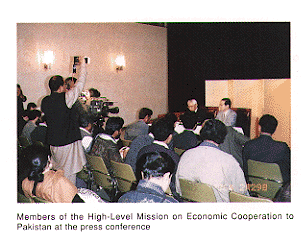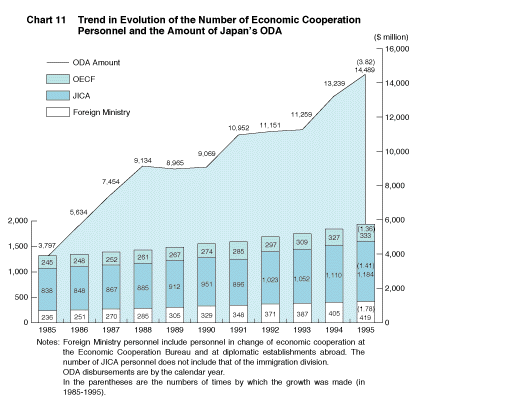Official Development Assistance (ODA)
10. Efficient and Effective Implementation of Aid
(1) Stepping Up Policy Dialogue and a Preliminary Survey
Since developing countries bear the principal responsibility for development, it is critically important to have sufficient exchange of views among the donor and the recipient. Thus, the Japanese Government attaches importance to preliminary surveys and policy dialogues with recipient countries. For such purposes, the Japanese Government sent high-level missions to major recipient countries to formulate ODA country policies covering priority areas.
(2) The Strengthening of the Aid Administration Machinery
While Japan currently provides the largest volume of aid in the world, the aid administration machinery is hardly adequate compared with those of other donor countries. Given the prospects that Japan will play an increasingly important role as a major donor country in coordinating aid policies with other countries, it is necessary to further increase its aid officials, while continuing the efforts of building an efficient administration system.
(3) Strengthening the Evaluation and Follow-up Systems
The Ministry of Foreign Affairs has been upgrading its evaluation efforts by adding new schemes, such as third-party evaluations commissioned to knowledgeable persons or private groups, joint evaluations conducted with other donor countries or international organizations, and evaluations by recipient countries. The findings of the evaluations are published annually in the form of Economic Cooperation Evaluation Report. The Ministry also has strengthened the follow-up system (e.g. providing spare parts), while taking care not to discourage the self-help efforts of developing countries.
(4) "Software" Cooperation: Assistance to Institution Building and Policy Making
In carrying out aid projects for developing countries, particularly those trying to introduce a market economy, assistance in the field of software, including human resources development, institution building, and policy making, plays a critical role. Aware of this, Japan has been extending active support to Poland and Viet Nam, which are actively promoting market-oriented economies, in formulating industrial policies or development plans and making laws.
(5) Emergency Relief
When a developing country is attacked by a disaster, Japan dispatches to the disaster-stricken country an international relief team providing medical services and carrying out emergency relief operations and rehabilitation activities. Japan also sends emergency relief goods (tents, blankets, and medical supplies, etc.) and provides emergency funds to the stricken country. The Japan Disaster Relief Team stands ready to leave for the stricken area within 24 hours, and the Japan Medical Team for Disaster Relief within 48 hours, once receiving a request.
(6) Grass-roots Assistance
The Japanese Government has been strengthening a system for encouraging private citizens to participate in development projects, a mechanism which complements large-scale ODA activities and is capable of flexible reaction to meet local needs in developing countries. Grant Assistance for Grass-roots Projects is the scheme to finance relatively small-scale projects carried out in developing countries by non-governmental organizations or local governments. Lately, grass-roots assistance is expanding in size and thus has become an important pillar in Japan's ODA activities.
(7) Coordination among Different ODA Mechanisms
With a view to enhancing the effectiveness and efficiency of ODA, the Government of Japan has been seeking the most effective coordination among different types of ODA, i.e. technical cooperation, ODA loans and grant aid. For instance, Japan tries to strengthen good coordination between grant aid projects and technical cooperation by sending Japanese medical doctors and other specialists to hospitals and laboratories financed by grant aid.
(8) Coordination of Aid between Donor Countries and International Organizations
Given limited financial and human resources available for development efforts, coordination of aid among donor countries and international organizations is imperative. In this respect, Japan holds a number of policy dialogues with major donor countries (the United States and France) and international organizations (UNICEF and UNDP). Japan also tries to realize donor coordination at the project level when it brings meaningful achievements.
(9) South-south Cooperation
The term "South-south cooperation" refers to the cooperation extended by a developing country which has achieved a certain level of development to other developing countries. Technological transfer in the framework of the South-south cooperation is effective especially when the level of transferring technology fits the development stage of the assisted country concerned. Recognizing the importance of such cooperation, Japan International Cooperation Agency (JICA) actively supports the developing countries' efforts to carry out such South-south cooperation through providing funds needed by a host developing country for inviting trainees from its neighboring countries.


